Boxing career
Reynolds' first recorded professional bout is listed against Len Wickwar, a far more experienced fighter from Leicester. The match took place 20 October 1930 at Stourbridge, and although Reynolds was Welsh born, he was now boxing out of Wolverhampton in England, and rarely fought in his home country. Wickwar won on a points decision after the contest went the distance. Reynolds would face Wickwar at least six times throughout his professional career, losing all the encounters, five on points. Reynolds first recorded pro win was over Norman Snow, beating him on 2 November 1930 and then again three weeks later.
On his journey to becoming Welsh lightweight champion Reynolds faced several notable boxers, losing to Welsh Champion Phineas John, losing twice and winning once against British Lightweight Champion George Daly and a points win over Northern-area champion Jimmy Stewart. On 11 November 1937, Reynolds faced Boyo Rees in a challenge for the Welsh lightweight title. The bout, held in Reynolds' hometown of Swansea, was scheduled for fifteen rounds, but was stopped in the tenth when Rees was forced to retire with a cut eye. [1] Between gaining the title and his first title defence Reynolds took in five fights, winning only once. He beat a fairly inexperienced Hal Cartwright, but then lost three straight bouts against Dave Crowley, Lefty Satan Flynn and Jimmy Walsh. This losing streak was only halted by a draw with London journeyman Tommy Hyams.
His first title defence for the Welsh belt was against Glen Evans at Briton Ferry on 9 November 1937; the fight ended in the ninth with Reynolds winning by knockout. [2] He then lost to future British Lightweight champion Eric Boon before beating Northern-area title holder Jack Carrick. Reynolds followed his victory over Carrick with a second Welsh title defence, this time a re-match with Boyo Rees. The match, held at the Pavilion in Mountain Ash on 4 April 1938, went the distance of fifteen rounds, with Reynolds losing the Championship title on points. [2] Reynolds made one more title attempt, this time for the Welsh welterweight title, failing in his bid against Taffy Williams.

Freddie Welsh was a Welsh World boxing champion. The lightweight boxer was born in Pontypridd, Wales, nicknamed the "Welsh Wizard". Brought up in a tough mining community, Welsh left a working-class background to make a name for himself in America. He turned professional as a boxer in Philadelphia in 1905, and spent the best part of his career fighting in the United States.

Luigi Giuseppe d'Ambrosio, lalso known as Lou Ambers, was an American World Lightweight boxing champion who fought from 1932 to 1941. Ambers fought many other boxing greats, such as Henry Armstrong and Tony Canzoneri.
Brian Mitchell is a South African former professional boxer who competed from 1981 to 1995. He held the WBA super-featherweight title from 1986 to 1991, The Ring super-featherweight title from 1986 to 1988, and the IBF super-featherweight title from 1991 to 1992.
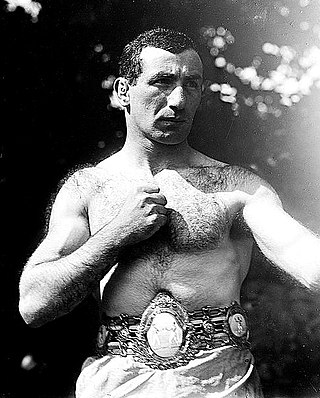
Matthew Wells was a British professional boxer in the lightweight and welterweight divisions. In 1911, he held the Lightweight Championship of Great Britain, and in 1914 he claimed the Welterweight Championship of Britain and the Welterweight Championship of the World.
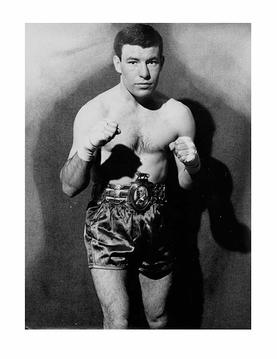
Brian Nancurvis, who fought under the name Brian Curvis as a professional, was a boxer from Swansea, Wales who was active from 1959 to 1966. He fought as a Welterweight, becoming British welterweight champion in 1960. He retired as undefeated champion and is the only welterweight to have won two Lonsdale Belts outright. The four defeats in his professional career were all to foreign boxers; he was never beaten by a British boxer.
Jason Cook is a former professional boxer, who fought under the nickname "The Power". As an amateur, he won a silver medal for Wales at the 1994 Commonwealth Games. As a professional, he has fought as a lightweight, and has won both the European and IBO championships at the weight. He currently campaigns at Light-Welterweight, and fights out of Fight Academy Wales gym in Llanharan, South Wales under the guidance of professional coach Darren Wilson.

Hyman Barnett "Harry" Mizler was an English boxer who competed for Great Britain in the 1932 Summer Olympics and won the British BBoC Lightweight title in January 1934.
Pat Thomas was a Light-middleweight boxer, originally from Saint Kitts and Nevis, who took British citizenship and won two British boxing titles in the 1970s and 80s. After leaving Saint Kitts, Thomas settled in Cardiff in Wales, and is recognised as a Welsh fighter taking the Welsh light middleweight Championship in 1977.
Syd Worgan was a professional boxer from Wales. Born in Llanharan Worgan was notable for becoming the Welsh featherweight champion in 1944.
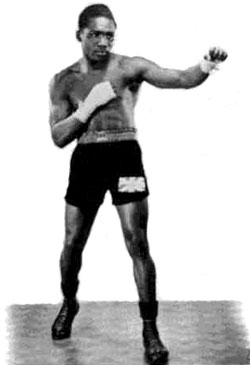
Lefty 'Satan' Flynn born Selvin Campbell in British Honduras was a professional boxer. Flynn also known as His Satanic Majesty fought out of Jamaica becoming Jamaican featherweight and later welterweight champion. After taking the Jamaican titles he moved to Britain in late 1936. Flynn was a successful opponent in British boxing circles and fought many of the up-and-coming fighters of his age. In 1954 he made an unsuccessful attempt at the British Honduras welterweight title in Belize City.
Ronnie James was a British Lightweight boxing champion. Born in Swansea, Wales, James had over 130 professional bouts winning 114 of them, 61 through knockout. In 1946 he challenged Ike Williams at Cardiff for the NBA Lightweight title, but lost the contest in the ninth round.
Neil Haddock is a Welsh former lightweight and super featherweight boxer. Before turning professional he won a silver medal as a lightweight at the 1986 Commonwealth Games. His early career as a professional lightweight was not very notable, but after a year out from boxing caused by an eye injury, he returned fitter and lighter as a super featherweight. In 1992 he became the Welsh super featherweight champion, taking the British title just five months later. He retired from boxing in 1994.
Floyd Havard is a Welsh former super featherweight boxer. He was twice British super featherweight champion, from 1988–1989 and 1994-1996. In 1994 he made an unsuccessful bid for the IBF super featherweight title against John John Molina.
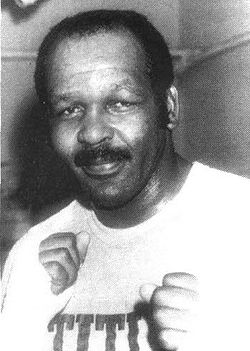
Neville Meade was a British boxer from Swansea. Born in Montserrat, he moved to Wales at the age of nine. He rose to prominence when he won the gold medal in the heavyweight division at the 1974 Commonwealth Games in New Zealand. He turned professional in 1974 and won the Welsh Heavyweight title in 1976 and then followed this with the British title in 1981. He retired in 1983 after a failed defence of his British title.
Dennis Jeffrey Avoth was an Egyptian-born British heavyweight boxer. Avoth was a promising amateur boxer who turned professional in 1967. He held the Welsh Heavyweight Championship title from 1971 to 1973. He was the brother of Eddie Avoth, who was also a boxer and who became British, and Commonwealth Light-heavyweight champion, and European Light-heavyweight challenger. Dennis Avoth died in Glamorgan on 20 December 2023, at the age of 76.
George Sutton, Sr was a Welsh boxer who held the Welsh flyweight title on two occasions. His brother, Jackie Sutton, also held a Wales boxing belt and his son, George Jr, contested the British Bantamweight title.
Billy Waith was a Welsh welterweight boxer. He made an unsuccessful challenge for the British Welterweight title in 1978 against Henry Rhiney and became Wales Welterweight champion in 1982, holding it until his retirement from the sport in 1984.
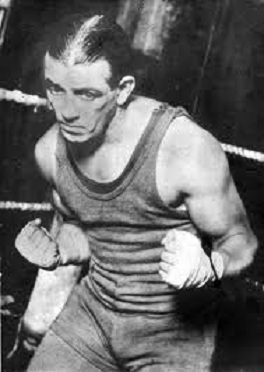
Harry Mason was a British boxer who was a British and European (EBU) champion in the lightweight division and British champion in the welterweight division.
Henry Owens, who fought under the name Jake Kilrain, was a Scottish boxer who was British welterweight champion between 1936 and 1939.
Jimmy Walsh was a British boxer who was British lightweight champion between 1936 and 1938. He should not be confused with the American World Bantamweight Champion, Jimmy Walsh.







